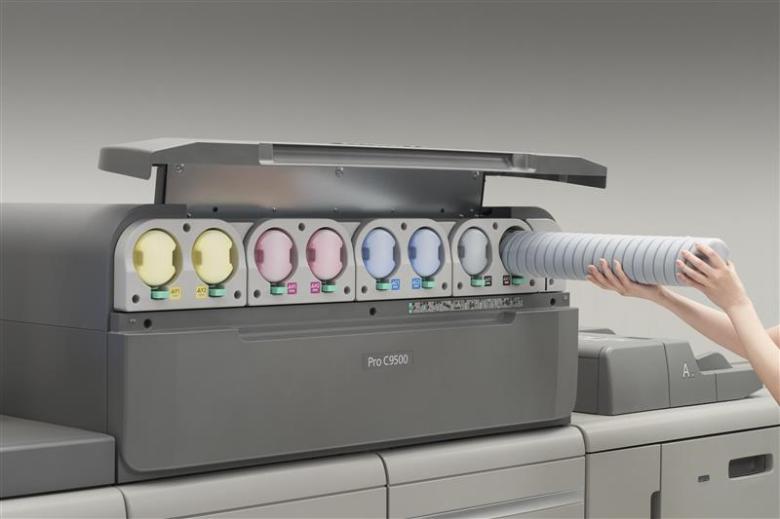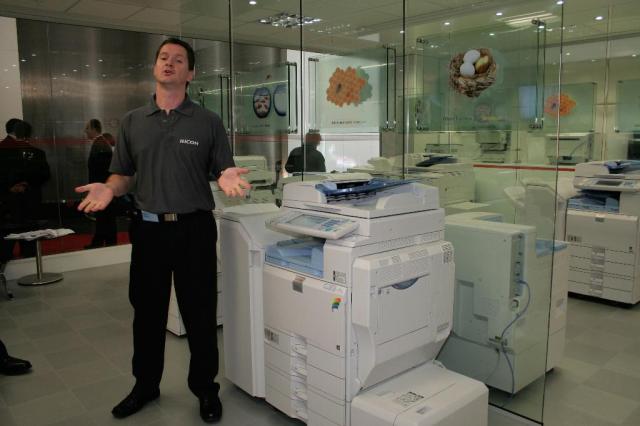
As a recognised leader in sustainability, Ricoh continues to deliver practical innovations that minimise environmental impact without compromising on performance.
Driving sustainable solutions
One standout development is the High Caliper Media Customisation for the Pro C9500 digital press, which revolutionises sustainable printing by enabling rigid, paper-based gift cards and luxury packaging to replace PVC. These cards are recyclable, sourced from responsible materials, and enhanced with compostable laminates and food-safe toners.
“This innovation empowers printers to diversify into eco-friendly applications like bespoke packaging, point-of-sale displays, and high-impact direct mail, providing clients with sustainable choices that don’t compromise on quality,” said Henryk Kraszewski, senior product and marketing manager at Ricoh Australia.
“By turning plastic products into premium paper alternatives, Ricoh helps printers stay competitive and environmentally responsible.”
Beyond thick media, Ricoh incorporates recycled steel in equipment manufacturing, develops biomass toners with plant-based resins, and provides industry-leading recycling programs with up to 98 per cent resource recovery.
Recognitions such as the Buyers Lab 2024-2025 Pacesetter Award, EcoVadis Platinum, and Global 100 rankings reflect the company’s leadership, demonstrating that sustainability is embedded across its technology, supply chain, and customer solutions.

Global and local sustainability targets
Ricoh has set clear global goals in its pursuit of environmental sustainability. It is aiming for net-zero greenhouse gas emissions by 2050, supported by an interim target of a 63 per cent reduction by 2030. The company has also set a target of 50 per cent renewable energy usage across global operations by fiscal 2030.
At a local level, Ricoh Australia is leading by example. Its recycling programs already achieve up to 98 per cent resource recovery for end-of-life devices, with plans to exceed 99 per cent by partnering with new recycling providers in FY25.
“We continue to expand initiatives like compostable packaging through our Green-pack solution, reinforcing Ricoh’s commitment to a circular economy and helping customers meet their own sustainability targets,” Kraszewski said.
Data-driven automation for sustainable print
Automation and data are critical for achieving sustainable print production.
Ricoh’s presses feature inline sensors and automated colour controls that minimise makeready waste, ensuring each print meets strict quality standards.
“Total Flow workflow solutions optimise job batching and resource allocation, reducing paper, energy, and consumables usage. Data analytics provide insight into consumption patterns, helping printers identify opportunities to further reduce waste and emissions,” said Kraszewski.
“By combining automation with actionable data, Ricoh enables printers to improve efficiency, lower costs, and achieve measurable sustainability outcomes aligned with client expectations.”
Overcoming sustainability challenges
Printers face rising client expectations for sustainable products while navigating the cost and performance concerns of adopting eco-friendly alternatives.
One example where Ricoh helps overcome these hurdles is by providing a thick media printing solution that allows paper-based cards and packaging to replace PVC, delivering recyclable, high-quality options.
“Our comprehensive recycling programs simplify responsible disposal of consumables, while Ricoh’s consulting helps printers market their sustainability credentials with confidence,” said Kraszewski.
“By combining innovative technology, end-of-life solutions, and practical guidance, Ricoh supports printers in meeting sustainability demands without compromising quality or profitability.”
Sustainability trends shaping the future of print
Looking ahead, Ricoh anticipates significant growth in premium paper-based applications replacing plastics across gift cards, luxury packaging, and direct mail, driven by consumer demand for environmentally responsible products.
“On-demand digital printing will further reduce waste and carbon footprints by eliminating excess inventory and shortening supply chains,” Kraszewski said.
“Automation and data-driven optimisation will empower printers to demonstrate measurable sustainability achievements.
“Printers who invest in flexible, eco-friendly solutions today, like High Caliper Media Customisation, will be best positioned to capture these opportunities and lead as sustainability becomes a key market differentiator.”
This first appeared in the August edition of ProPrint magazine.
Comment below to have your say on this story.
If you have a news story or tip-off, get in touch at editorial@sprinter.com.au.
Sign up to the Sprinter newsletter


